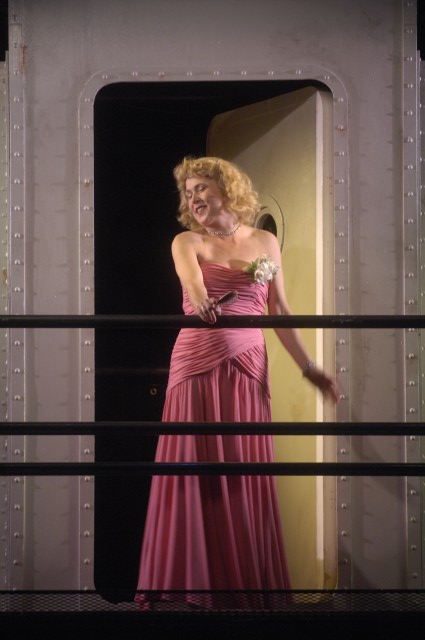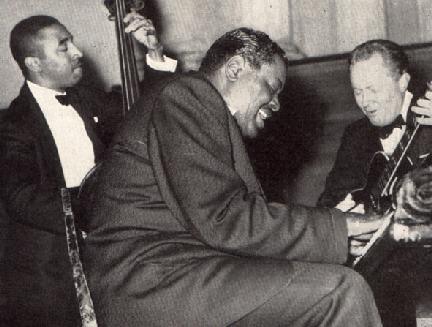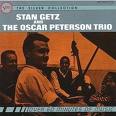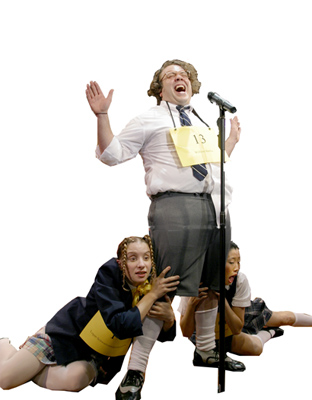MRS. FINNEY: Can’t we have some peace in this house, even on New Year’s Eve?
SADIE: You got it mixed up with Christmas. New Year’s Eve is when people go back to killing each other.
Joseph L. Mankiewicz, screenplay for A Letter to Three Wives
Archives for December 2007
TT: Life without Broadway
 This week’s Wall Street Journal drama column is devoted to my annual rundown of the shows and performances I liked best in the year just past.
This week’s Wall Street Journal drama column is devoted to my annual rundown of the shows and performances I liked best in the year just past.
It’s a long list, consisting mainly (but by no means exclusively) of off-Broadway and out-of-town productions, though I did find room for several Broadway shows, including (no surprises here) Conor McPherson’s The Seafarer, Tracy Letts’ August: Osage County, the Roundabout Theatre Company’s Pygmalion, and the revival of Harold Pinter’s The Homecoming that I reviewed enthusiastically in last week’s column.
As for the news from elsewhere, I make mention of the excellence of theater in Chicago, the acting of Hal Holbrook and James Whitmore, the funniest show I saw in 2007, and numerous other good things.
To read all about it–and to find out who the very amusing lady in the photo is–go here.
TT: Almanac
“Man and wife, being two, are one in love.”
William Shakespeare, Henry V
TT: Oscar Peterson, R.I.P.
Oscar Peterson, who died on Sunday, was one of a handful of jazz musicians to have cultivated a virtuoso technique comparable to that of the greatest classical instrumentalists. In part for this reason, he never got along well with jazz critics, most of whom were (and are) too musically ignorant to appreciate the near-unique nature of his achievement. Peterson’s peers knew better. He was very, very popular–every great virtuoso is–but it was his fellow artists who gauged his worth most accurately. Like Buddy Rich, he left a trail of collegial awe behind him wherever he went.
Peterson got more bad reviews than any other major jazz pianist, and on occasion he deserved them. Miles Davis, one of the few musicians of importance to have said anything unpleasant about him, famously remarked that Peterson “makes me sick because he copies everybody. He even had to learn how to play the blues.” That was both nasty and untrue, but it did point to the chink in his armor. Unlimited virtuosity is a snare for the unwary artist. “Only in limitation,” Goethe wrote, “is mastery revealed.” Peterson’s extreme technical facility, by contrast, sometimes lured him into the trap of glibness. When he was coasting, all you heard was the fireworks. Nor did it help that he recorded so prolifically throughout his seven-decade-long career. No one can make that many records save at the price of consistent inspiration, and Peterson paid that price too often for comfort.
 He was at his best from 1953 to 1958, when he led a drummerless trio featuring the guitarist Herb Ellis and the bassist Ray Brown that was celebrated for its aggressive, unrelenting swing. Peterson and his colleagues modeled themselves on the legendary King Cole Trio, but unlike that deliciously easy-going ensemble, the Peterson Trio was a straight-ahead group whose members favored fast tempos and liked nothing better than to light the afterburner and take off. Most of their recordings are out of print, but The Oscar Peterson Trio at Zardi’s, a thrilling live album recorded in 1955 at a Los Angeles nightclub, captures them at their most characteristic.
He was at his best from 1953 to 1958, when he led a drummerless trio featuring the guitarist Herb Ellis and the bassist Ray Brown that was celebrated for its aggressive, unrelenting swing. Peterson and his colleagues modeled themselves on the legendary King Cole Trio, but unlike that deliciously easy-going ensemble, the Peterson Trio was a straight-ahead group whose members favored fast tempos and liked nothing better than to light the afterburner and take off. Most of their recordings are out of print, but The Oscar Peterson Trio at Zardi’s, a thrilling live album recorded in 1955 at a Los Angeles nightclub, captures them at their most characteristic.
When Ellis decided to quit the road, Peterson replaced him not with another guitarist but with a drummer, the tasteful and elegant Ed Thigpen, thereby recharging his creative batteries for another half-dozen years. It was this version of the Oscar Peterson Trio that recorded most frequently, and one must pick and choose carefully among its many albums to get a clear sense of how good the group could be. Fortunately–and not coincidentally–the most popular of its recordings, Night Train, is also one of the finest. An after-hours 1962 studio set devoted to blues tunes and blues-flavored pop songs, Night Train shows how deeply Peterson could dig when he felt like laying back instead of showing off.
Peterson’s later albums are typically less interesting than the ones he made with Brown, Ellis, and Thigpen, but My Favorite Instrument, a 1968 collection of unaccompanied piano solos called that was privately recorded in Germany under optimal circumstances, is worthy of special mention. His playing here is both precisely controlled and consistently inspired, and even his harshest critics have singled it out as noteworthy. I also like The Trio, a live set from 1973 featuring the guitarist Joe Pass and the bassist Niels Pedersen, which contains a version of Nat Cole’s “Easy Listening Blues” that shows how much Peterson learned from his nonpareil predecessor.
 In addition to recording with his own groups, Peterson cut hundreds of albums as a sideman, most of them made in the days when he was barnstorming with Norman Granz’s Jazz at the Philharmonic concert troupes and doubling as house pianist for Verve, Granz’s record label. He recorded with everyone who worked for Granz–Louis Armstrong, Roy Eldridge, Ella Fitzgerald, Billie Holiday, Charlie Parker, Ben Webster, Lester Young, even Fred Astaire–and his sensitive, discreet support rarely failed to stimulate those for whom he played. Stan Getz and the Oscar Peterson Trio, recorded in 1957, is an especially choice example of his prowess as an accompanist.
In addition to recording with his own groups, Peterson cut hundreds of albums as a sideman, most of them made in the days when he was barnstorming with Norman Granz’s Jazz at the Philharmonic concert troupes and doubling as house pianist for Verve, Granz’s record label. He recorded with everyone who worked for Granz–Louis Armstrong, Roy Eldridge, Ella Fitzgerald, Billie Holiday, Charlie Parker, Ben Webster, Lester Young, even Fred Astaire–and his sensitive, discreet support rarely failed to stimulate those for whom he played. Stan Getz and the Oscar Peterson Trio, recorded in 1957, is an especially choice example of his prowess as an accompanist.
Peterson also wrote a memoir, A Jazz Odyssey, about which I wrote in Commentary when it was published in 2002:
I can think of no other jazz autobiography that has made the mysteries of music-making so readily accessible to the lay reader. Even those who dislike Oscar Peterson’s playing will find his book informative–surely a near-unprecedented achievement….
Despite his gifts as a raconteur, Peterson is not a natural writer–his ghostwritten prose is too often stiff and ostentatious–but when he speaks of music, the results have a clarity and specificity rarely found in books of this genre. And unlike most jazz memoirists, he is even willing to be critical of other players, including some of the most admired musicians in jazz. Peterson’s analysis of the “uneven and unfinished” playing of the bebop pianist Bud Powell, for instance, cuts sharply against the grain of conventional critical wisdom, and whether or not one agrees with his conclusions, they merit close scrutiny, not only in their own right but for the perspective they offer on his own remarkable technical achievements.
Alas, A Jazz Odyssey is out of print, but Gene Lees’ Oscar Peterson: The Will to Swing is still available in paperback. An intelligent and warmly sympathetic biography by one of the few jazz critics who appreciated Peterson properly, it profits from Lees’ close friendship with his subject.
Peterson was crippled by a stroke in 1993, and though he continued to play in public, his last performances added no luster to his reputation. Now that the long sunset of his post-stroke career is over, my guess is that he will fade from view for a time–perhaps even a long time. But sooner or later some patient and industrious critic will sift through the mountain of variably inspired recordings that he left behind, separate the wheat from the chaff, and tell a later generation of listeners what those who admired Oscar Peterson in his lifetime already know: when he was good, no one was better.
TT: So you want to see a show?
Here’s my list of recommended Broadway and off-Broadway shows, updated weekly. In all cases, I gave these shows favorable reviews in The Wall Street Journal when they opened. For more information, click on the title.
Tickets to all of these shows were available at the box office last week.
Because of the recently settled stagehands’ strike, many Broadway shows are offering heavily discounted tickets to certain performances. For information, go here.
BROADWAY:
• August: Osage County (drama, R, adult subject matter, closes Mar. 9, reviewed here)
• Avenue Q (musical, R, adult subject matter and one show-stopping scene of puppet-on-puppet sex, reviewed here)
• A Chorus Line (musical, PG-13/R, adult subject matter, reviewed here)
• The Farnsworth Invention (drama, PG-13, reviewed here)
• Grease (musical, PG-13, some sexual content, reviewed here)
• The Homecoming (drama, R, adult subject matter, closes Apr. 13, reviewed here)
• Is He Dead? (farce, G, reasonably family-friendly, reviewed here)
• Rock ‘n’ Roll * (drama, PG-13, way too complicated for kids, reviewed here)
• The Seafarer (drama, PG-13, adult subject matter, reviewed here)
 • The 25th Annual Putnam County Spelling Bee (musical, PG-13, mostly family-friendly but contains a smattering of strong language and a production number about an unwanted erection, closes Jan. 20, reviewed here)
• The 25th Annual Putnam County Spelling Bee (musical, PG-13, mostly family-friendly but contains a smattering of strong language and a production number about an unwanted erection, closes Jan. 20, reviewed here)
OFF BROADWAY:
• The Devil’s Disciple (drama, G/PG-13, not suitable for children, closes Jan. 27, reviewed here)
• The Fantasticks (musical, G, suitable for children old enough to enjoy a love story, reviewed here)
CLOSING NEXT WEEK:
• Cymbeline (drama, PG, too complicated for kids, closes Jan. 6, reviewed here)
• The Glorious Ones (musical, R, extremely bawdy, closes Jan. 6, reviewed here)
CLOSING SUNDAY:
• The Drowsy Chaperone (musical, G/PG-13, mild sexual content and a profusion of double entendres, reviewed here)
• Things We Want (drama, R, adult subject matter, reviewed here)
TT: Almanac
KATHY: Eddie’s the only fella in town who doesn’t pass judgment on people.
ED: That’s right. If I did, I wouldn’t have any friends.
Scott Alexander and Larry Karaszewski, screenplay for Ed Wood
TT: Almanac
These are enough
Left overs to do, warmed-up, for the rest of the week–
Not that we have much appetite, having drunk such a lot,
Stayed up so late, attempted–quite unsuccessfully–
To love all our relatives, and in general
Grossly overestimated our powers.
W.H. Auden, For the Time Being: A Christmas Oratorio
TT: Almanac
“‘Home’ is any four walls that enclose the right person.”
Helen Rowland, Reflections of a Bachelor Girl
